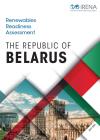

-
-
IRENA (2021), Renewables Readiness Assessment: Belarus, International Renewable Energy Agency, Abu Dhabi.
Copied
/-/media/Files/IRENA/Agency/Publication/2021/Jul/IRENA_RRA_Belarus_2021.pdf
Copied
Renewables Readiness Assessment: Belarus
Newsletter
Отчет также доступен на русском языке.
Renewable energy has been growing steadily in the Belarusian energy sector over the past decade, accounting for 7.1% of the country’s final energy consumption in 2019. Belarus does not have significant local energy resources, apart from renewables.
Fossil fuels currently make up more than 90% of the energy mix in Belarus, with natural gas taking the lion’s share. Power generation is also predominantly fossil fuel-based, with very limited integration of renewable sources. Energy imports amount to 84.8% of the total primary energy supply and come primarily from a single source supplier, leaving Belarus as one of the world’s most energy import-dependent countries in the world.
Increasing deployment of renewable energy technologies would support Belarus’ domestic energy supply. Most of Belarus’s renewable energy production comes from biofuels, there is significant potential for biomass, biogas, solar and wind development and integration across all end use sectors.
Greening the energy sector would directly reduce emissions, thereby supporting a sustainable and environmentally sound development pathway for the country. Increased renewable energy deployment would also have a direct contribution towards the country’s economic growth and energy sector security as well as contributing to local value creation, including employment opportunities and industrial development.
This Renewables Readiness Assessment from IRENA highlights the challenges and provides 11 recommendations to harness the potential of renewable energy sources in Belarus. These are as follows:




